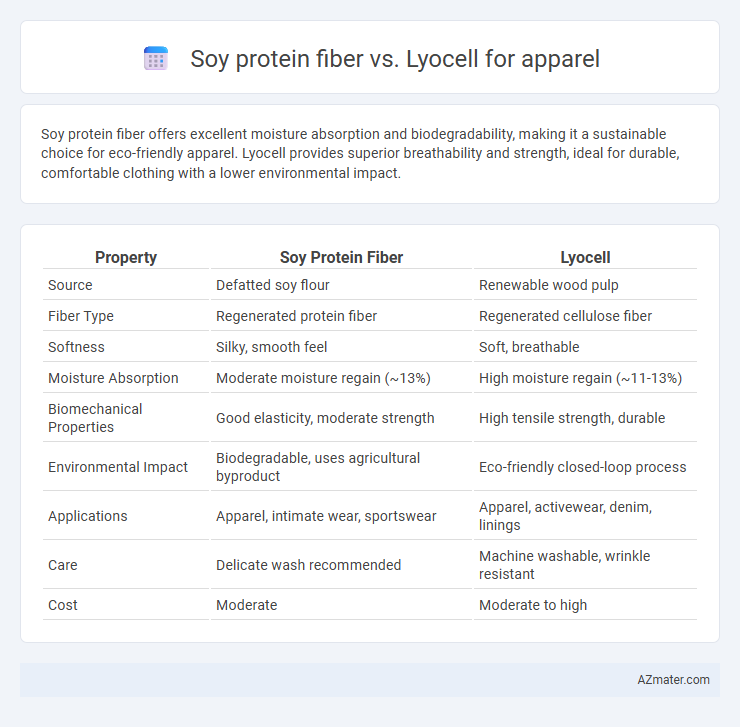Soy protein fiber offers excellent moisture absorption and biodegradability, making it a sustainable choice for eco-friendly apparel. Lyocell provides superior breathability and strength, ideal for durable, comfortable clothing with a lower environmental impact.
Table of Comparison
| Property | Soy Protein Fiber | Lyocell |
|---|---|---|
| Source | Defatted soy flour | Renewable wood pulp |
| Fiber Type | Regenerated protein fiber | Regenerated cellulose fiber |
| Softness | Silky, smooth feel | Soft, breathable |
| Moisture Absorption | Moderate moisture regain (~13%) | High moisture regain (~11-13%) |
| Biomechanical Properties | Good elasticity, moderate strength | High tensile strength, durable |
| Environmental Impact | Biodegradable, uses agricultural byproduct | Eco-friendly closed-loop process |
| Applications | Apparel, intimate wear, sportswear | Apparel, activewear, denim, linings |
| Care | Delicate wash recommended | Machine washable, wrinkle resistant |
| Cost | Moderate | Moderate to high |
Introduction to Sustainable Apparel Fibers
Soy protein fiber and Lyocell represent innovative sustainable apparel fibers derived from renewable resources, offering eco-friendly alternatives to traditional materials. Soy protein fiber, sourced from soybean meal, provides softness and biodegradability, while Lyocell is produced from sustainably harvested wood pulp using a closed-loop process that minimizes environmental impact. Both fibers contribute to reducing carbon footprints, water usage, and chemical consumption in the textile industry, making them pivotal in advancing sustainable fashion.
What is Soy Protein Fiber?
Soy protein fiber is a sustainable, biodegradable textile made from defatted soybean flakes, rich in amino acids that enhance fabric softness and moisture absorption, making it ideal for apparel with skin-friendly properties. It offers excellent breathability and elasticity, providing comfort and durability in clothing applications. Compared to Lyocell, which is derived from sustainably sourced wood pulp and valued for its smooth texture and moisture-wicking ability, soy protein fiber emphasizes eco-friendliness through agricultural waste utilization and enhanced thermal insulation.
What is Lyocell?
Lyocell is a sustainable cellulose fiber derived from wood pulp, primarily sourced from eucalyptus trees, known for its eco-friendly closed-loop production process that minimizes environmental impact. It offers exceptional softness, breathability, and moisture-wicking properties, making it ideal for comfortable and durable apparel. Compared to soy protein fiber, Lyocell provides superior strength, resilience, and a smooth texture, enhancing garment longevity and wearability.
Production Process: Soy Protein Fiber vs Lyocell
Soy protein fiber is produced through a solvent-spinning process where soy protein isolate is dissolved and extruded into fibers, often combined with synthetic polymers to enhance strength and durability. Lyocell undergoes a closed-loop solvent spinning process using cellulose from sustainably harvested wood pulp, where the non-toxic solvent N-methylmorpholine N-oxide (NMMO) is recycled with minimal environmental impact. The production of Lyocell emphasizes eco-friendly practices and high moisture absorption, whereas soy protein fiber manufacturing leverages agricultural byproducts but may involve chemical additives for fiber stability.
Environmental Impact Comparison
Soy protein fiber offers a biodegradable and renewable alternative to traditional textiles, with a production process that uses less water and energy compared to synthetic fibers. Lyocell, derived from sustainably sourced wood pulp, boasts a closed-loop production system that recycles solvents and minimizes chemical waste, significantly reducing environmental pollution. Both fibers contribute to sustainable fashion by lowering carbon footprints, but Lyocell's efficient solvent recovery system provides a higher level of eco-friendliness in large-scale manufacturing.
Comfort and Wearability
Soy protein fiber offers exceptional softness and moisture-wicking properties, enhancing comfort and breathability in apparel. Lyocell excels with its smooth texture, durability, and excellent moisture management, providing a luxurious feel and long-lasting wearability. Combining natural fibers with advanced processing techniques, both materials support sustainable fashion while prioritizing comfort and performance.
Durability and Care Requirements
Soy protein fiber offers moderate durability with good flexibility, making it suitable for lightweight apparel but requiring gentle washing to maintain its integrity and prevent pilling. Lyocell fibers, made from wood pulp via a closed-loop process, provide superior strength and resistance to wear, enabling frequent machine washing without significant loss of fabric quality. Care requirements for Lyocell are simpler as it resists shrinkage and wrinkles better than soy protein fiber, which may demand air drying and mild detergents to preserve its softness and durability.
Performance in Apparel Applications
Soy protein fiber offers excellent moisture-wicking properties and natural antibacterial benefits, enhancing comfort and hygiene in activewear and casual apparel. Lyocell excels in durability and breathability due to its strong cellulose structure, making it ideal for performance wear that requires both softness and resilience. Both fibers provide sustainable alternatives with soy protein contributing protein-enriched softness and Lyocell delivering superior moisture management for high-performance clothing.
Cost and Market Availability
Soy protein fiber typically offers a cost-effective alternative to Lyocell in apparel manufacturing due to lower raw material expenses and simpler production processes. Lyocell, derived from sustainably sourced wood pulp, commands higher prices driven by its advanced environmentally friendly production methods and strong market demand. Market availability of Lyocell is broader, supported by established supply chains and growing consumer preference for sustainable fabrics, while soy protein fiber remains niche with limited large-scale distribution.
Future Prospects: Soy Protein Fiber vs Lyocell in Fashion
Soy protein fiber offers sustainable benefits with biodegradability and moisture-wicking properties, making it an innovative choice for eco-conscious apparel brands. Lyocell, derived from eucalyptus pulp, excels in softness, breathability, and durability, appealing to premium fashion markets prioritizing comfort and environmental responsibility. Future prospects favor both fibers as demand for sustainable textiles grows, with soy protein fiber poised for niche organic blends and lyocell expanding in performance wear and luxury segments.

Infographic: Soy protein fiber vs Lyocell for Apparel
 azmater.com
azmater.com